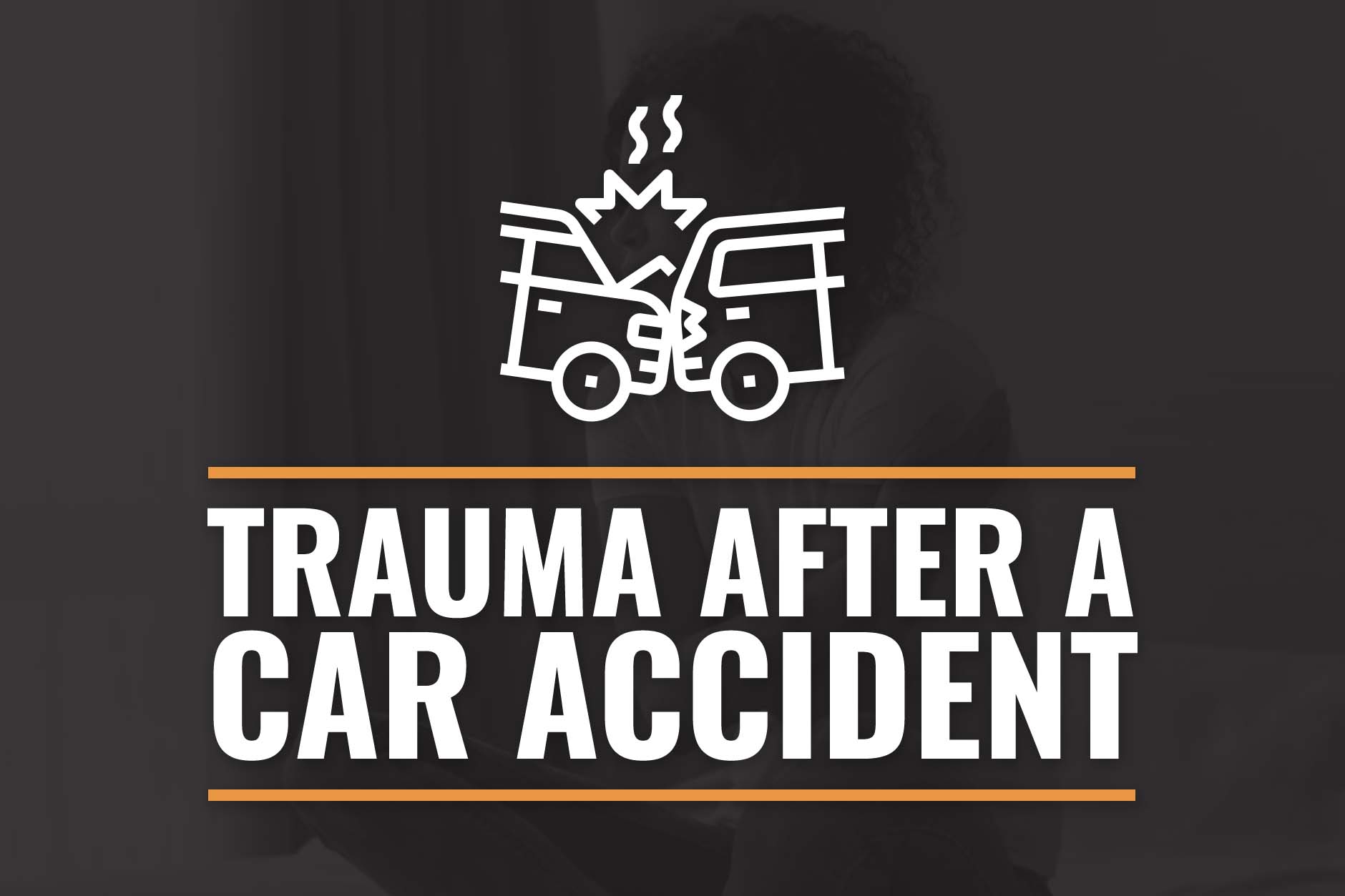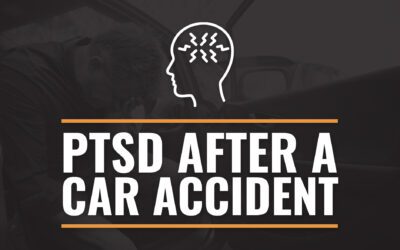
Table of Contents
Road travel can be unpredictable. Even if you’re a cautious driver, you may be sharing the streets and highways with motorists who aren’t, and a car accident can happen at any time. According to the Michigan State Police, there were over 293,000 crashes on Michigan roads in 2022, resulting in 70,281 injuries and 1,123 fatalities.
Those who survive motor vehicle accidents often grapple with psychological distress as well as physical injuries. Many go on to develop post-traumatic stress disorder (PTSD), a debilitating condition that can significantly affect one’s life.
At LegalGenius, PLLC, our car accident lawyers understand the full impact a collision can have on your well-being and are here to help you recover your health as well as compensation. In this article, our personal injury lawyers outline what you need to know about trauma after a car accident and how we can help you regain your quality of life.
What is Post-Traumatic Stress Disorder (PTSD)?
Post-Traumatic Stress Disorder (PTSD) is a mental health condition triggered by traumatic experiences like car accidents. When a person faces a traumatic situation, it can overwhelm their brain’s usual stress-coping mechanisms. As a result, the individual may retain vivid, distressing memories of the event, leading to PTSD.
Symptoms of PTSD
The symptoms of PTSD can vary but often include the following:
- Intrusive Thoughts: These unwelcome and repeated memories of the trauma can manifest as flashbacks, nightmares, and severe emotional or physical responses to anything that reminds one of the trauma.
- Avoidance Behavior: Individuals with PTSD may avoid anything related to the trauma, such as places, activities, or people linked to the event. In the context of a car accident, this can impact your ability to drive safely.
- Negative Changes in Thoughts and Mood: These changes may include persistent negative feelings about oneself or others, a lack of interest in activities that were once enjoyable, and the inability to feel positive emotions.
- Intense Physical and Emotional Reactions: Symptoms in this category include being easily startled or always on the lookout for danger; trouble with sleeping or concentrating, and frequent irritability or angry outbursts.
Normal Stress vs. PTSD
It’s normal to feel stressed after a traumatic event like a car accident. However, when these symptoms persist for more than a month, seriously impact your life, and are not due to substances or another medical condition, they may be indicative of PTSD. While PTSD can have a lasting impact, with the right support and treatment, you can gradually regain a sense of normalcy.
Treatment for Trauma After a Car Accident
Treating PTSD after a car accident involves a combination of therapy, medication, or both. Below is an overview of the primary treatment methods:
Psychotherapy
Psychotherapy can help you mentally and emotionally process what happened to you. Depending on your circumstances, your doctor may recommend one or more of the following:
- Cognitive Behavioral Therapy (CBT): CBT is a form of talk therapy that focuses on altering negative patterns of thinking and behavior that contribute to your distress.
- Prolonged Exposure Therapy: This treatment helps you overcome fear by gradually exposing you to your trauma-related thoughts, feelings, and situations. For example, if you’re afraid of driving after an accident, you might start by imagining driving, then sit in a parked car, and eventually progress to driving short distances.
- Stress Inoculation Therapy (SIT): SIT aims to build resilience against stress by teaching coping techniques such as deep breathing, muscle relaxation, and positive self-talk. This prepares you to handle stressful scenarios better.
- Eye Movement Desensitization and Reprocessing (EMDR): This therapy combines exposure techniques with guided eye movements to help change how traumatic memories affect you. It’s particularly effective for people who have experienced trauma from a specific event like a car accident.
Medication
Medications are often used alongside psychotherapy to manage symptoms of PTSD. Common options include:
- Antidepressants: These medications are commonly prescribed to help alleviate depression and anxiety by adjusting neurotransmitter levels in the brain. They can help reduce feelings of sadness, anxiety, and emotional numbness.
- Anti-anxiety Medications: For acute stress and anxiety symptoms, medications like benzodiazepines may be prescribed. However, due to their potential for dependency, they are usually recommended for short-term use.
- Antipsychotics: In severe cases of PTSD (or when other treatments have not been effective), antipsychotics may be used to manage symptoms such as severe anxiety, agitation, or sleep disturbances.
A combination of medication and psychotherapy can significantly improve the quality of life for those suffering from PTSD following a car accident, enabling them to reduce their symptoms and regain control over their lives.
Coping Mechanisms for PTSD
Recovery from something as traumatic as a car accident depends on finding effective ways to cope with the aftermath. Managing your symptoms of PTSD not only helps you regain control over your daily life but also improves your interactions at work and with loved ones.
Mind-Body Techniques
Adding mind-body techniques to your routine can help alleviate PTSD symptoms by improving your connection between mind and body. These strategies include:
- Deep Breathing: This simple technique can be done anytime and anywhere. Focus on taking slow, deep breaths to help calm your nervous system and reduce anxiety and stress.
- Trauma-Informed Yoga: This form of yoga combines physical poses with an acute awareness of trauma’s impact on you. It helps you reconnect with and regain awareness of your body, which is often lost in the aftermath of trauma due to dissociation or detachment.
- Journaling: Writing down your thoughts and feelings can be a therapeutic way to process the trauma. It helps lessen distress and enhances your mental well-being.
Healthy Lifestyle
Maintaining a healthy lifestyle is crucial in managing PTSD symptoms. This includes regular sleep patterns and a calming bedtime routine, along with a balanced diet and engaging in regular physical activity, such as walking, yoga, or any exercise you enjoy. Exercise in particular helps release endorphins, natural mood enhancers that reduce depression and anxiety symptoms.
Support Groups
Joining a support group allows you to share your experiences and learn from others who understand what you’re going through, helping to reduce feelings of isolation. You can also turn to your family, as their patience, understanding, and support can significantly influence your recovery process.
The journey to recovery varies for everyone. Some people may continue to struggle with anxiety, while others might overcome flashbacks or nightmares more quickly. By recognizing and addressing harmful thought patterns, you can reduce symptoms of PTSD and improve your social interactions, work performance, and general well-being.
Can You Sue for Trauma After a Car Accident in Michigan?
Yes, you can sue for mental trauma following a car accident if you meet certain conditions. When dealing with psychological injuries from a collision, you have several options for seeking compensation.
Suing for No-Fault Benefits
If your auto insurance company refuses to cover or discontinues payment for medical treatments related to your psychological injuries, you can file a lawsuit for these unpaid benefits. These benefits may include medical bills, attendant care, mileage to and from medical appointments, replacement services (like housekeeping), and lost wages if your injuries prevent you from working.
Suing the At-Fault Driver for Pain and Suffering
You can also pursue compensation for pain and suffering from the driver responsible for the accident. However, to do this, you need to prove two things:
- The other driver was at fault for the accident.
- Your psychological injury qualifies as a “serious impairment of body function” according to state auto law. This means your injury must significantly affect your ability to lead your normal life.
Suing for Additional Economic Damages
Beyond suing for pain and suffering, you can also pursue the at-fault driver for other economic losses. These might include:
- Excess medical bills that are not covered by your insurance.
- Future medical expenses related to your psychological injuries.
- Lost wages that exceed the coverage provided by your insurance.
Consulting with a personal injury lawyer will give you the best chance of receiving the compensation you need to cope with your trauma and move forward.
How Can a Michigan Car Accident Lawyer Help?
If you’ve developed PTSD following a car accident, a Michigan car accident lawyer can help you understand your legal rights and options. During your initial free consultation, they will gather information about the accident and the extent of your injuries, including any signs of PTSD. This helps them evaluate the strength of your case, understand the impact the accident has had on your life, and determine the liability of the other party involved. If you proceed with a personal injury claim, they can:
- Guide You Through the Legal Process: Coping with the aftermath of an accident can be overwhelming. Personal injury lawyers simplify this process by explaining each step, from filing your claim to the possibility of going to trial. They help organize the necessary documents, explain important timelines, and let you know what to expect, reducing your stress and making everything more manageable.
- Pursue Compensation: The primary goal of a personal injury lawyer is to help you secure compensation for the various losses you’ve incurred. This includes medical expenses, the cost of therapy for PTSD, and any lost wages if you’ve had to take time off work. They understand the financial burdens and emotional trauma that come with car accidents and work to alleviate them through legal means.
- Represent You in Negotiations: It is common for insurance companies to try to reduce their payouts, making them challenging to deal with. A personal injury lawyer can present your medical records and evidence of PTSD and negotiate for a settlement that fairly compensates you for your losses.
- Assist in Litigation: Your lawyer can take your case to court if a fair settlement can’t be reached through negotiations. They will advocate on your behalf, strive to prove the other party’s liability, and seek the compensation you deserve.
Having a skilled car accident lawyer by your side can positively influence the outcome of your case. Their legal experience and acumen not only provide peace of mind but also ensure you receive the necessary support and compensation to aid in your recovery from PTSD and other accident-related injuries.
Get a Free Consultation From a Michigan Car Accident Lawyer
Recovering from a car accident can be incredibly challenging, especially when it involves mental trauma like PTSD. Understanding your legal rights and the options available for seeking compensation is therefore essential. Whether you’re facing unpaid medical bills, need support for long-term care, or are struggling with lost wages, the law provides pathways to help you manage these burdens.
If you or someone you know is struggling with the effects of a car accident, don’t face this situation alone. LegalGenius, PLLC, is ready to fight for the compensation and support you need to move forward with your life. For more information or to schedule your free consultation, fill out our Ask the Genius™ form or call (800) 209-4000 today.

Attorney Jeffrey Perlman
Attorney Jeffrey Perlamn is the managing partner at LegalGenius, PLLC. He has helped Metro Detroit accident victims recover the compensation they deserve for over 35 years. He believes everyone should have access to justice and the legal system, which is why Attorney Perlman spends his time outside of the courtroom writing informational blogs on the LegalGenius website that are accessible to all.


